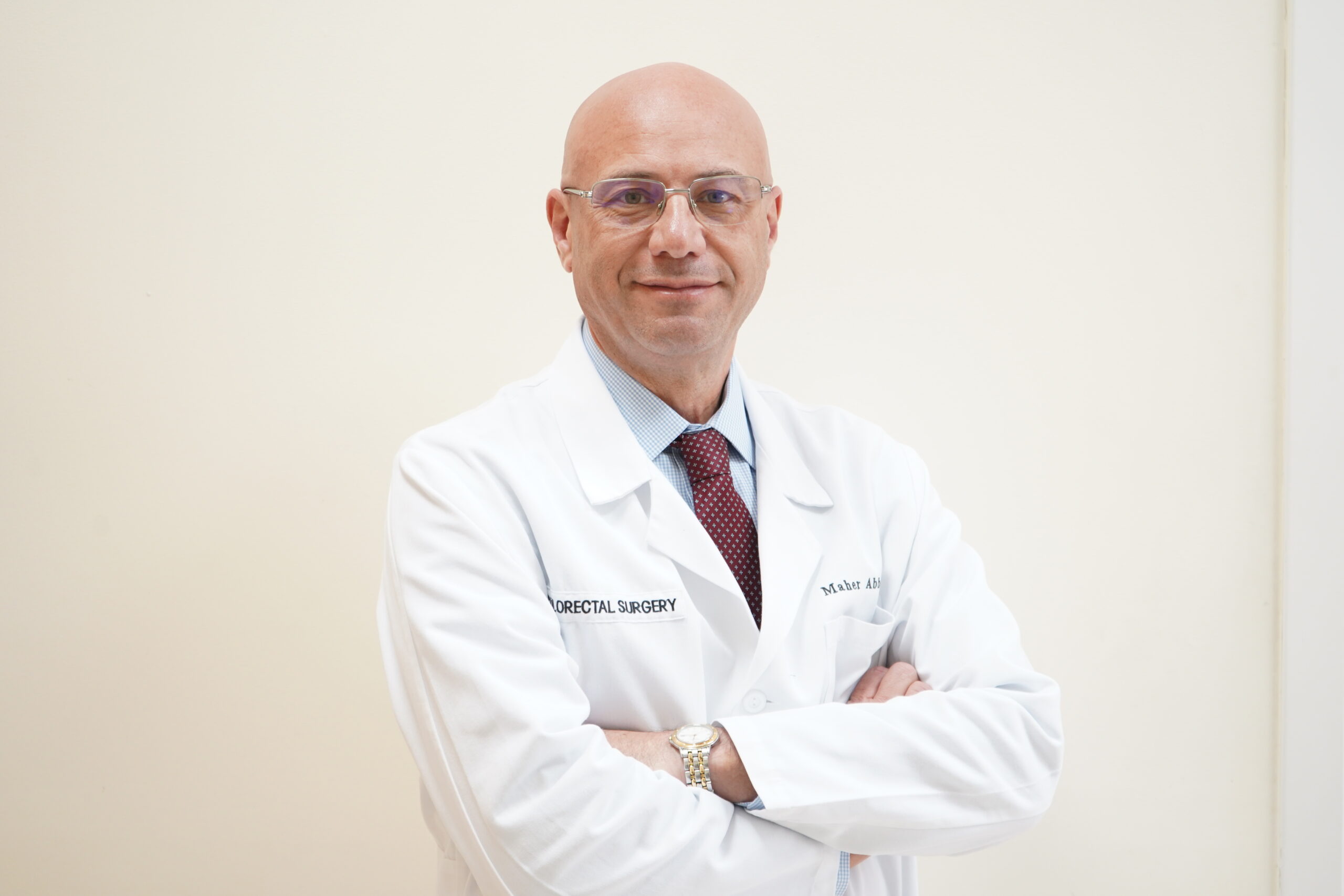What is colon cancer?
All of the body’s cells normally grow, divide, and then die in order to keep the body healthy and functioning properly. Sometimes this process gets out of control: cells keep growing and dividing even when they are supposed to die. When the cells lining of the colon multiply uncontrolled, cancer can ultimately develop in any part of the colon [Figure 1]. Colorectal cancer ranks as the second to third most common cancer in the world depending on the geographic location. It affects both men and women. In the USA approximately 1 in 20 people will develop colorectal cancer.

Figure 1 – Picture of the colon
What are the symptoms of colon cancer?
It is important to know that most patients with colon cancer do not have any family history of colon cancer or polyps. Furthermore, most patients with early colon cancer or precancerous polyps have no symptoms [Figure 2]. Therefore, it is very important for any person over the age of 40 to undergo Screening for Colon Polyps and Cancer.

Figure 2 – A colon growth presents initially as a polyp in most patients and eventually grows deeper into a cancer
It is very important to tell your doctor if you have of the following symptoms which can be caused by colon cancer or polyps:
- Abdominal pain or gas pains with or without vomiting
- Anemia
- Change in the stool caliber or narrowing of the stool
- Change in your normal bowel habits
- Constipation or diarrhea
- Fatigue
- Incomplete emptying of the bowel
- Intestinal spasm with or without bloating
- Rectal bleeding (bright red or dark blood)
- Unexplained weight loss
How is colon cancer diagnosed?
Colonoscopy is the best test to diagnose colon cancer. A tiny flexible tube with a video camera attached to its tip is inserted through the anus and advanced inside the colon [Figure 3]. If a growth is detected it can be removed in its entirety if small and at the precancerous stage. If there is suspicion for cancer, it is biopsied and sent for evaluation.

Figure 3 – Colonoscopy
When colon cancer is confirmed, special blood tests called tumor markers (CEA and CA 19-9) are obtained. Imaging of the chest and abdomen and pelvis with a special XRAY called CT scan (computed tomography) is obtained. Staging of the cancer is undertaken to determine how far the cancer has spread: stage 1 (superficial cancer in the bowel wall surface), stage 2 (deep cancer in the bowel wall), stage 3 (cancer that has spread to the lymph nodes outside the colon), stage 4 (cancer that has spread to other parts of the body including liver or lungs) [Figure 4].

Figure 4 – Colon cancer stage
How is colon cancer treated?
Colon cancer can be cured when caught in the early stages. The main treatment modality for most patients is surgery although some patients with very early cancer or precancerous polyps can be treated with endoscopic removal without scars, a technique offered by Dr. Maher Abbas (Endoscopic Resection of Polyps and Tumors, Transanal Endoscopic Surgery). For larger or deeper cancer, surgery to remove the cancer along with the lymph nodes (glands) is necessary for a potential cure. Minimally invasive surgical techniques such as laparoscopic camera (keyhole surgery) is offered by Dr. Maher Abbas, a highly specialized surgeon and leader in minimally invasive surgery techniques and Laparoscopic Camera Surgery. During surgery, the segment of colon that has cancer is removed along with the blood vessels and attached lymph nodes.
Is colon cancer curable?
Cancer confined to the lining of the colon is associated with the highest likelihood of cure. For patients with deep tumors or cancer that has spread to the lymph nodes or other internal organs such as liver, lungs, or abdomen, chemotherapy or biological therapy is added following the surgery. Depending on your condition and cancer stage, Dr. Maher Abbas will refer you to a trusted medical oncology colleague for additional treatment. It is also very important to monitor you long-term for any signs of recurrence as cancer can come back in some patients. A combination of physical examination, blood work, colonoscopy, and special XRAY studies such as CT scan or PET CT is advisable. Dr. Maher Abbas will customize your care based on your condition.
Why is it important to seek a board certified colorectal surgeon for your care?
Cancer of the colon requires a high degree of expertise in cancer care. The cancer needs to be treated properly for best long-term outcome and a chance for cure. Dr. Maher Abbas is an American Board Certified colon and rectal surgeon with extensive expertise in colon and rectal surgery. He is a Diplomate of the American Board of Surgery and the American Board of Colon and Rectal Surgery. He is a Fellow of the American College of Surgeons and the American Society of Colon and Rectal Surgeons. To date, Dr. Maher Abbas has performed over 15,000 operations and procedures. He is globally known for his colon and rectal surgery expertise and skills in minimally invasive surgical techniques.

If you would like to schedule an appointment with Dr. Maher Abbas to learn more about the surgical and treatment options for your cancer condition, click here.






